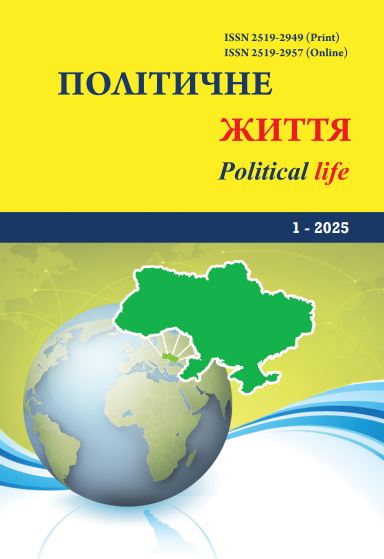The Influence of Mentality and Political Traditions of Ukrainians on the Content and Effectiveness of Political Communication
DOI:
https://doi.org/10.31558/2519-2949.2025.1.6Keywords:
political communications, mentality, political mentality, political traditionsAbstract
The article analyzes the content and tasks of political communication. Mentality and political traditions have a significant impact on the content and effectiveness of modern political communications, as they reflect the historical experience of state-building, interaction between the government and the people, determine the level of trust between communication participants, public sentiment (likes/ dislikes) and aspirations, peculiarities of information perception, markers of its importance (primarily, this applies to current or historically sensitive discussion topics), the propensity of citizens to certain forms of political participation, etc is substantiated. The article examines the peculiarities of the mentality and political traditions of Ukrainian society, which should be taken into account when building modern political communications, interaction between citizens and political institutions, political actors at different levels. The main ones are justified: weakness of the rational component and high level of emotional perception of information and decision-making of a significant part of Ukrainian society; low level of trust in the government, political institutions, politicians; high sensitivity to social problems (poverty, inequality, abuse of power); local traditions and regional differences; paternalistic attitudes, a rather high level of tolerance for corruption and abuse of power, inferiority complex (primarily among older generations associated with being part of the Soviet Union). After the full-scale military aggression of the Russian Federation, the deep patriotism of Ukrainians, the desire to preserve national identity and statehood, combined with courage and bravery to defend the Motherland, continuing the traditions of the Cossack struggle, the UPA soldiers, and all those who fought for the independence and identity of the Ukrainian state, can be observed on a mass level.
References
Hordiichuk O. The Ideological and Ontological Causes of Russia’s War on Ukraine. West versus East, Tyranny versus Democracy. ETHICS IN PROGRESS. 2023. Vol. 14 (1). P. 4–23. DOI: https://doi.org/10.14746/eip.2023.1.1
Hordiichuk O., Dekert T., & Lysetska Y. Polityczne i mentalne aspekty integracji Ukrainy z Europą. Przegląd Politologiczny. 2024. № 2. P. 59–75. DOI: https://doi.org/10.14746/pp.2024.29.2.5
Hordiichuk O., Halapsis A., & Kozlovets M. How the information warfare turns into full-scale military agression: the experience of Ukraine. Przegląd Strategiczny. 2023. №16. P. 345–362. DOI: https://doi.org/10.14746/ps.2023.1.25
Johnson-Cartee K. S. Strategic Political Communication: Rethinking Influence, Persuasion, and Propaganda. Lanham: Rowman&Littlefield. 2004. 229 p.
Mishalova O., Hordiichuk O., Sokolovskyi O. Russia’s War in Ukraine as a “War for Identity” and Appropriation of Cultural Tradition. ETHICS IN PROGRESS. 2024. Vol. 15(1). P. 73–94.
Perloff R. M. The Dynamics of Political Communication: Media and Politics in a Digital Age (3rd ed.). Routledge, 2021. DOI: https://doi.org/10.4324/9780429298851
Wolfsfeld G. Making Sense of Media and Politics: Five Principles in Political Communication (2nd ed.). Routledge, 2022. DOI: https://doi.org/10.4324/9781003176657
Акайомова А. Політична комунікація як процес взаємодії політичних суб'єктів. Політичний менеджмент. 2011. № 1. С. 87–91. URL: https://ipiend.gov.ua/wp-content/uploads/2018/08/akaiomova_politychna.pdf
Балтаджи П. Поняття «ментальність» у сучасних наукових дослідженнях. Актуальні проблеми політики. Одеса: Фенікс. 2012. Вип. 45. С. 21–28.
Вітман К., Кормич А. Відеоблоги як інноваційний засіб політичної комунікації. Актуальні проблеми політики. Видавничий дім «Гельветика». 2021. Вип. 68, С. 52–57. URL: http://app.nuoua.od.ua/archive/68_2021/68-2021.pdf#page=52
Гордійчук О. Вплив комуністичної ідеології та радянської дійсності на ментальність українців: соціально-філософський аналіз. Вісник Львівського університету. Серія філософсько-політологічні студії. 2019. № 24. С. 25–31.
Гордійчук О. Ментальність у добу глобалізації: монографія. Житомир, Вид-во "НОВОград". 2021. 372 с.
Гордійчук О. Еволюція політичних традицій та ментальності українського суспільства. Society and Security. 2024. № 2–3 (3). С. 28–35. URL: https://sas.ztu.edu.ua/article/view/311294/302518 https://doi.org/10.26642/sas-2024-2-3(3)-28-35
Гордійчук О. Трансформація політичної ментальність українського суспільства у період перебування в складі СРСР. Society and Security. 2024. №4 (4), С. 34–40. DOI: https://doi.org/10.26642/sas-2024-4(4)-34-40
Гордійчук О., Мосієнко О. Національна безпека України: виклики та пріоритети. "Вісник НЮУ імені Ярослава Мудрого". Серія: Філософія, філософія права, політологія, соціологія. 2024. № 3(62). С. 158–172. DOI: https://doi.org/10.21564/2663-5704.62.310882
Дяченко О. Основні моделі політичної комунікації та їх прояви в сучасну епоху. Вісник Донецького національного університету імені Василя Стуса, Сер.: Політичні науки. 2022. №7. С. 23-27. DOI: https://doi.org/10.31558/2617-0248.2022.7.4
Єжижанська Т. Корпоративні комунікації як стратегічний напрям діяльності організації. Наукові записки Національного університету "Острозька академія". Сер.: Культура і соціальні комунікації. 2009. Вип. 1. С. 43–49. URL: http://nbuv.gov.ua/UJRN/Nznuoaksk_2009_1_7
Заславська О. Політичні традиції як важливий соціокультурний інститут розвитку сучасного суспільства. Політикус. 2016. Вип. 2. С. 159–163.
Мак-Квейл Д. Теорія масової комунікації. Переклади з англ. О. Возьна, Г. Сташків. Львів : Літопис. 2010. 538 с.
Остапенко М. Політична комунікація: теоретичні аспекти дослідження. Політичний менеджмент. 2012. № 3. С. 135–144. URL: http://nbuv.gov.ua/UJRN/PoMe_2012_3_17
Політологічний енциклопедичний словник: Навч. посібник для студентів вищ.навч.закладів. К.: Генеза. 1997. 396 с.
Поліщук І. Модерна політична ментальність українського народу. Вісник Національного університету «Юридична академія України імені Ярослава Мудрого». 2018. № 2 (37). С. 93–106.
Проноза І. Роль політичних комунікацій у сучасному інформаційному просторі. Політикус: наук. журнал. 2021 № 3. С. 75–81. URL: http://dspace.pdpu.edu.ua/bitstream/123456789/12406/1/Pronoza.pdf
Рудакевич О. Традиції як базовий елемент національної політичної культури. Політологічний вісник : зб. наук. праць. К. : ІНТАС, 2010. Вип. 49. С. 291–299.
Шлемкевич Т. Політичні комунікації в українському інформаційному просторі. Вісник Прикарпатського університету. Серія: Політологія. 2024. Випуск 16. С. 42–47. DOI: https://doi.org/10.32782/2312-1815/2024-2-6
Чорна О. «Опора»: Основним джерелом інформації майже 80% українців є соціальні мережі. (2023). Детектор медіа. Офіційний вебсайт. URL: https://detector.media/infospace/article/213998/2023-07-10-oporaosnovnym-dzherelom-informatsii-mayzhe-80-ukraintsiv-ie-sotsialni-merezhi/

